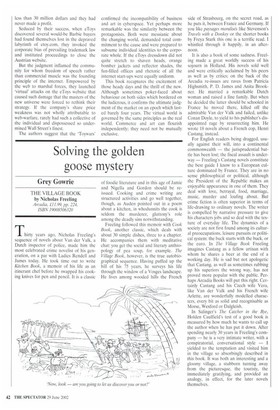Solving the golden goose mystery
Grey Gowrie
THE VILLAGE BOOK by Nicholas Freeling Arcadia, £11.99, pp. 224, ISBN 19008506320 Thirty years ago, Nicholas Freeling's sequence of novels about Van der Valk, a Dutch inspector of police, made him the most celebrated crime novelist of his generation, on a par with Ladies Rendell and James today. He took time out to write Kitchen Book, a memoir of his life as an itinerant chef before he swapped his cooking knives for pen and pencil. It is a classic
of foodie literature and in this age of Jamie and Nigella and Gordon should be reissued. Cooking and crime writing are structured activities and go well together, though, as Auden pointed out in a poem about a kitchen, in whodunnits the cook is seldom the murderer, gluttony's role among the deadly sins notwithstanding.
Freeling followed this memoir with Cook Book, another classic, which deals with about 30 simple dishes, three to a chapter. He accompanies them with meditative chat: you get the social and literary anthropology of pea soup, for example. The Village Book, however, is the true autobiographical sequence. Having puffed up the hill of his 75 years, he surveys his life through the window of a Vosges landscape. He lives among wooded hills the French side of Strasbourg, on the secret road, as he puts it, between France and Germany. If you like paysages moralises like Stevenson's Travels with a Donkey or the shorter books by Freya Stark this one is a terrific read. I whistled through it happily, in an afternoon.
It is also a book of some sadness. Freeling made a great worldly success of his sojourn in Holland. His novels sold well and were critically acclaimed by his peers as well as by critics; on the back of the Arcadia re-issues are raves from Patricia Highsmith, P. D. James and Anita Brookner. He married a remarkable Dutch woman and raised a fine family. But when he decided the latter should be schooled in France he moved there, killed off the admirable Van der Valk and failed, unlike Conan Doyle, to yield to his publisher's disappointed rage by resurrecting him. He wrote 18 novels about a French cop, Henri Castang, instead.
For English readers being dragged, usually against their will, into a continental commonwealth — the jurisprudential battle has been lost; the fiscal assault is underway — Freeling's Castang novels constitute the best guide I know to a European culture dominated by France. They are in no sense philosophical or political, although the President of the Republic makes an enjoyable appearance in one of them. They deal with love, betrayal, food, marriage, music, murder and loafing about. But crime fiction is often superior in terms of life-drawing to ordinary novels. The writer is compelled by narrative pressure to give his characters jobs and so deal with the texture of everyday life. The dynamics of a society are not first found among its cultural preoccupations, leisure pursuits or political system: the buck starts with the buck, or the euro. In The Village Book Freeling imagines Castang as a fellow artisan with whom he shares a beer at the end of a working day. He is sad but not apologetic that Castang, as well as sometimes rubbing up his superiors the wrong way, has not proved more popular with the public. Perhaps Arcadia Books will put this right. Certainly Castang and his Czech wife Vera, like Van der Valk and his French wife Arlette, are wonderfully modelled characters, every bit as solid and recognisable as Morse, Wexford or Daigleish.
In Salingefs The Catcher in the Rye, Holden Caulfield's test of a good book is measured by how much he wants to call up the author when he has put it down. After spending nearly 30 years in Freeling's company — he is a very intimate writer, with a conspiratorial, conversational style — I yielded to the temptation and visited him in the village so absorbingly described in this book. It was both an interesting and a gloomy village, a stubborn turning away from the picturesque, the touristy, the immediately gratifying, and provided an analogy, in effect, for the later novels themselves.


































































 Previous page
Previous page